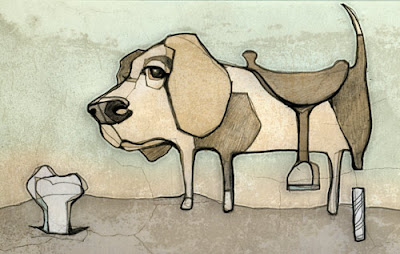By Mark Peters
My newest obsession is Terriers, an FX show created by Ted Griffin (who wrote Ocean’s Eleven) and Shawn Ryan (creator of The Shield, the best TV show ever). This show has deliciously Seinfeldian dialogue, effortless and charming acting, plus plots that are unpredictable and fresh. It’s even heart-wrenching at times, and I didn’t know I had a heart to wrench. This show is wonderful. Of course, no one is watching it.
One reason for the low ratings—suggested by everyone and their schnauzer—is that the title Terriers reveals nothing of what the show is actually about: a former cop and former criminal who have split the difference to become private investigators. That’s true. You won’t find any Wheaton terriers, Jack Russell terriers, or Yorkshire terriers—though a bulldog named Winston is a regular character. But terrier has been describing people as well as pooches for a long time, just like Doberman, pit bull, hound, and especially poodle. As quick as people are to anthropomorphize their dogs, we’re just as fond of poochopomorphizing ourselves. In honor of Terriers, here’s a look at words that have been transmitted from pooches to people.
As for terrier itself, it’s been used literally since the 1400’s and figuratively since the 1500’s. As the owner of a rat terrier, I can vouch for the OED’s definition: “A small, active, intelligent variety of dog, which pursues its quarry (the fox, badger, etc.) into its burrow or earth.” Believe me, if my dog were on the case, I would not want to be a rat, mouse, bunny, Smurf, or mole man. Metaphorical uses from 1622 (“Bonds and bills are but tarriers to catch fools.”) and 1779 (“Hunted…by the terriers of the law.”) show that the title of my new favorite show isn’t breaking any new ground. Terrier-osity, whether found in a dude or dog, is characterized by relentless determination that’s almost creepy: think of a Jack Russell who doesn’t seem aware there’s a world beyond his tennis ball.
As for a dog that is as well-established in language as it is horrible-reputation’d in general, you can’t beat the pit bull. Sarah Palin is synonymous with this breed, but she sure didn’t invent the comparison. A 1987 OED example involved a political hero of Palin’s: “President Reagan accused his Democratic critics in Congress Monday of practicing [sic] ‘pit bull economics’ that would ‘tear America’s future apart’ with reckless fiscal and trade policies.” Later citations mention “pit bull management” and “pit-bull intensity.” FYI, since I am a dog-lover, I have to share this article from Malcolm Gladwell on why pit bulls aren’t as deserving as demonization as you think. As with most dog problems, an idiotic owner is the key ingredient.
The word poodle has been prolific as poodles themselves, who seem to breed with anything that chases a squirrel, and maybe even squirrels themselves. There’s poodle-faker (an old term for a dandy, which feels like an old term itself), poodle parlor (a dog grooming business), and poodle skirt (an unfortunate fad in the fifties). Tony Blair was often described as George W. Bush’s poodle—that meaning of “poodle” is about a hundred years old, and it’s first found here in 1907: “The House of Lords consented… It is the right hon. Gentleman’s poodle. It fetches and carries for him. It barks for him. It bites anybody that he sets it on to.” A similar shade of meaning is used in th








Winston is adorable!